
- Home
- India
- World
- Premium
- THE FEDERAL SPECIAL
- Analysis
- States
- Perspective
- Videos
- Sports
- Education
- Entertainment
- Elections
- Features
- Health
- Business
- Series
- In memoriam: Sheikh Mujibur Rahman
- Bishnoi's Men
- NEET TANGLE
- Economy Series
- Earth Day
- Kashmir’s Frozen Turbulence
- India@75
- The legend of Ramjanmabhoomi
- Liberalisation@30
- How to tame a dragon
- Celebrating biodiversity
- Farm Matters
- 50 days of solitude
- Bringing Migrants Home
- Budget 2020
- Jharkhand Votes
- The Federal Investigates
- The Federal Impact
- Vanishing Sand
- Gandhi @ 150
- Andhra Today
- Field report
- Operation Gulmarg
- Pandemic @1 Mn in India
- The Federal Year-End
- The Zero Year
- Science
- Brand studio
- Newsletter
- Elections 2024
- Events
- Home
- IndiaIndia
- World
- Analysis
- StatesStates
- PerspectivePerspective
- VideosVideos
- Sports
- Education
- Entertainment
- ElectionsElections
- Features
- Health
- BusinessBusiness
- Premium
- Loading...
Premium - Events
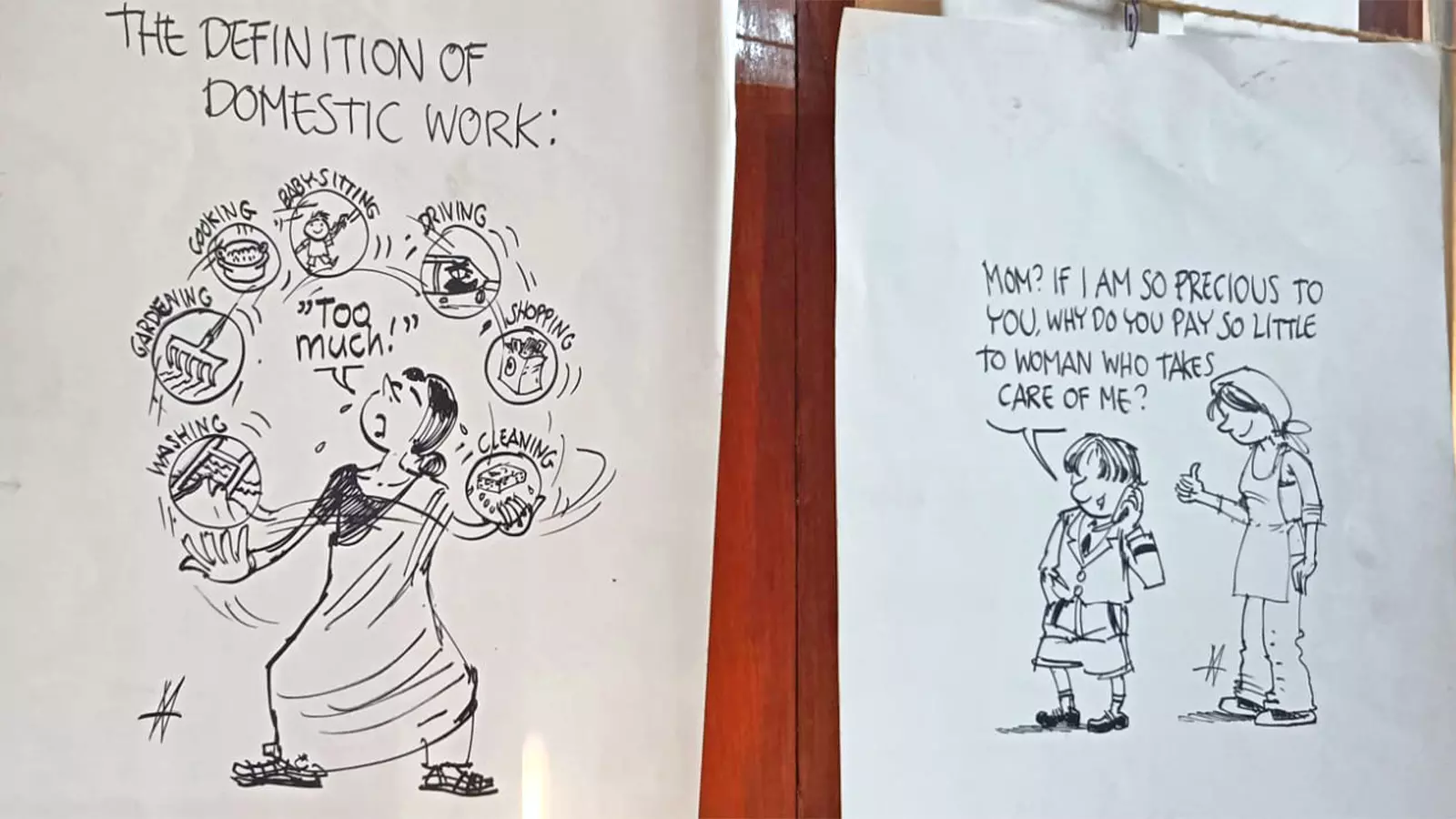
It was "an occasion of celebration" for 40-year-old Anu*, a domestic help from Karnataka’s Bengaluru. She wore her favourite red saree as she met her friends at an event in India’s IT hub on Wednesday (March 20). It was a gathering of around 80 domestic workers of the southern state to assert their political rights ahead of the 18th Lok Sabha elections beginning on April 19.The...
It was "an occasion of celebration" for 40-year-old Anu*, a domestic help from Karnataka’s Bengaluru. She wore her favourite red saree as she met her friends at an event in India’s IT hub on Wednesday (March 20). It was a gathering of around 80 domestic workers of the southern state to assert their political rights ahead of the 18th Lok Sabha elections beginning on April 19.
The nationwide elections for 543 Lok Sabha — the lower house of Indian parliament — seats to elect a new government will be held in seven phases — April 19, April 26, May 7, May 13, May 20, May 25 and June 1. The results will be declared on June 4, as stated by the Election Commission of India on March 16.
Karnataka with 28 seats will vote in two phases —14 each — on April 26 and May 7. While the Bharatiya Janata Party or BJP is in power at the centre, the Congress is ruling Karnataka since it won the assembly elections last year.
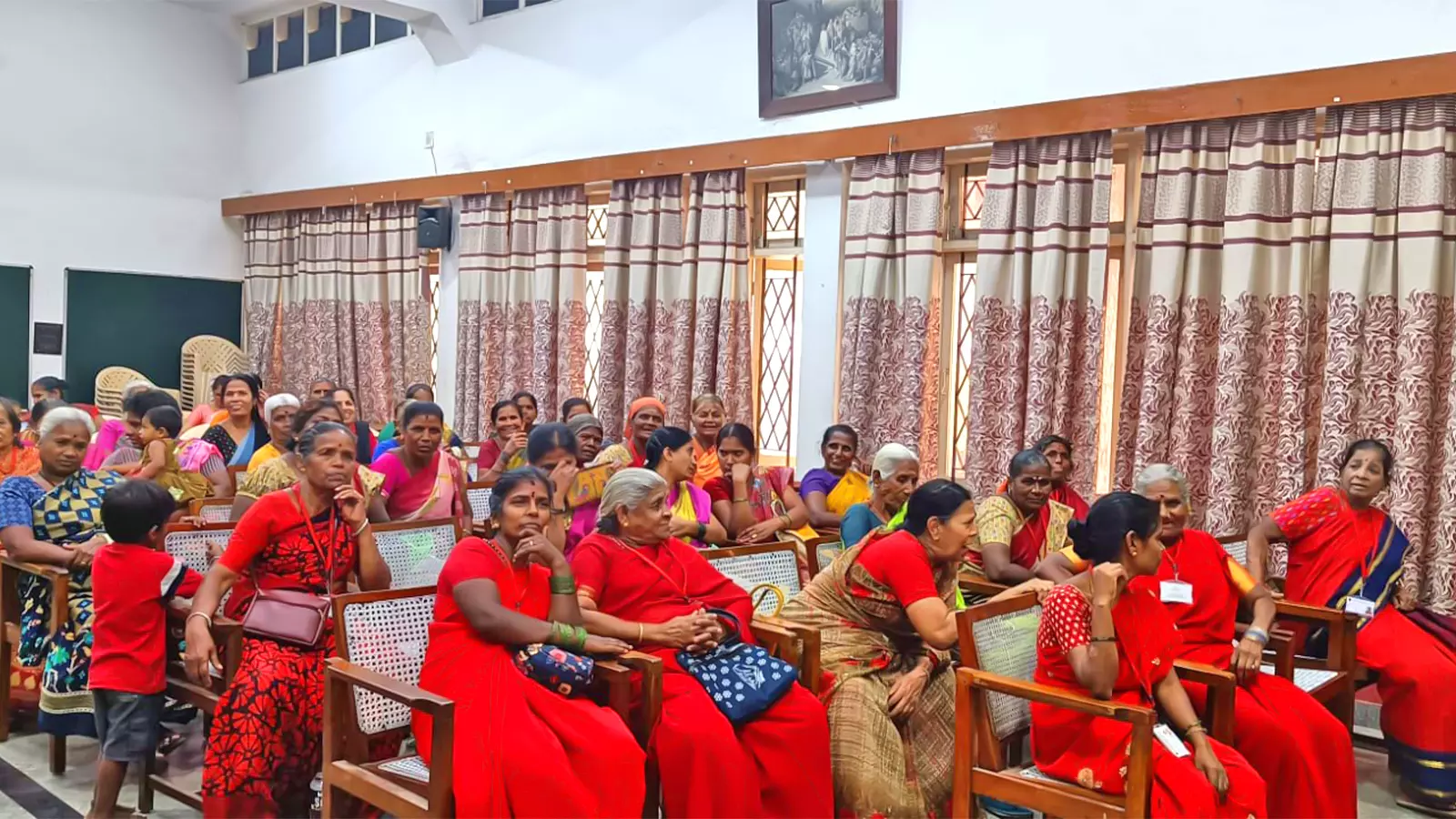
The participants at the event are part of the Domestic Workers Rights Union.
All, except for a few women, wore sarees in shades of red to celebrate their sisterhood and working-class status. It was late afternoon after they finished their cooking and cleaning job and they were drained, bone-tired and exhausted. But there was excitement too.
Anu said it was an opportunity she could not miss. “It is not often that so many of us (domestic workers) get to be together and share our personal stories,” she added.
Personal is political
Geetha Menon, co-founder of Stree Jagruti Samiti, an organisation that champions the cause of domestic workers, said, “In their personal stories lie their political stories.”
The participants, under the umbrella of the Domestic Workers Rights Union, have been victims of political apathy for ages. Pushpa* (46), a union member, lamented that hardly any political party talks about issues of the informal workforce. They face many challenges including low wages, long working hours, poor working conditions and no social security cover.
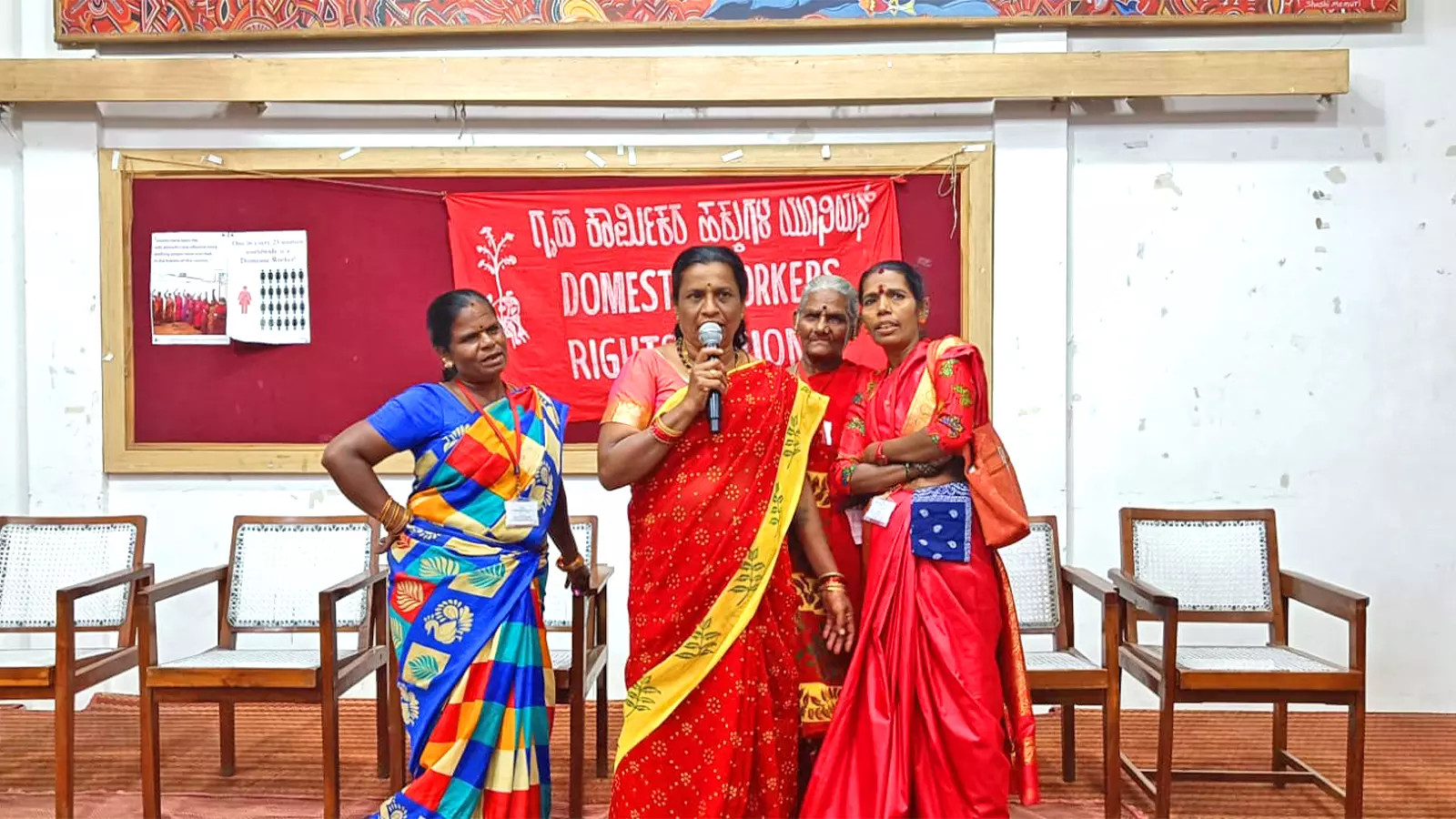
The women sang, danced and laughed to celebrate their togetherness in good and bad times.
“The women face multiple discrimination because of their gender, class and caste. In the informal workforce, they are placed at the lowest rung. They are not even considered as workers. They are called as ‘servants’ — which reeks of feudalism in a democratic country,” said Menon.
A celebration of sisterhood
As the atmosphere turned sombre after several women narrated their trials and tribulations to earn a livelihood and support their families to The Federal, a few women stood at the podium and started singing. The mood soon turned festive.
Everyone laughed in gay abandon when the women sang the famous yesteryear's Bollywood song, "Bambai se aaya mera dost, dost ko salam karo, raat ko khao piyo..."
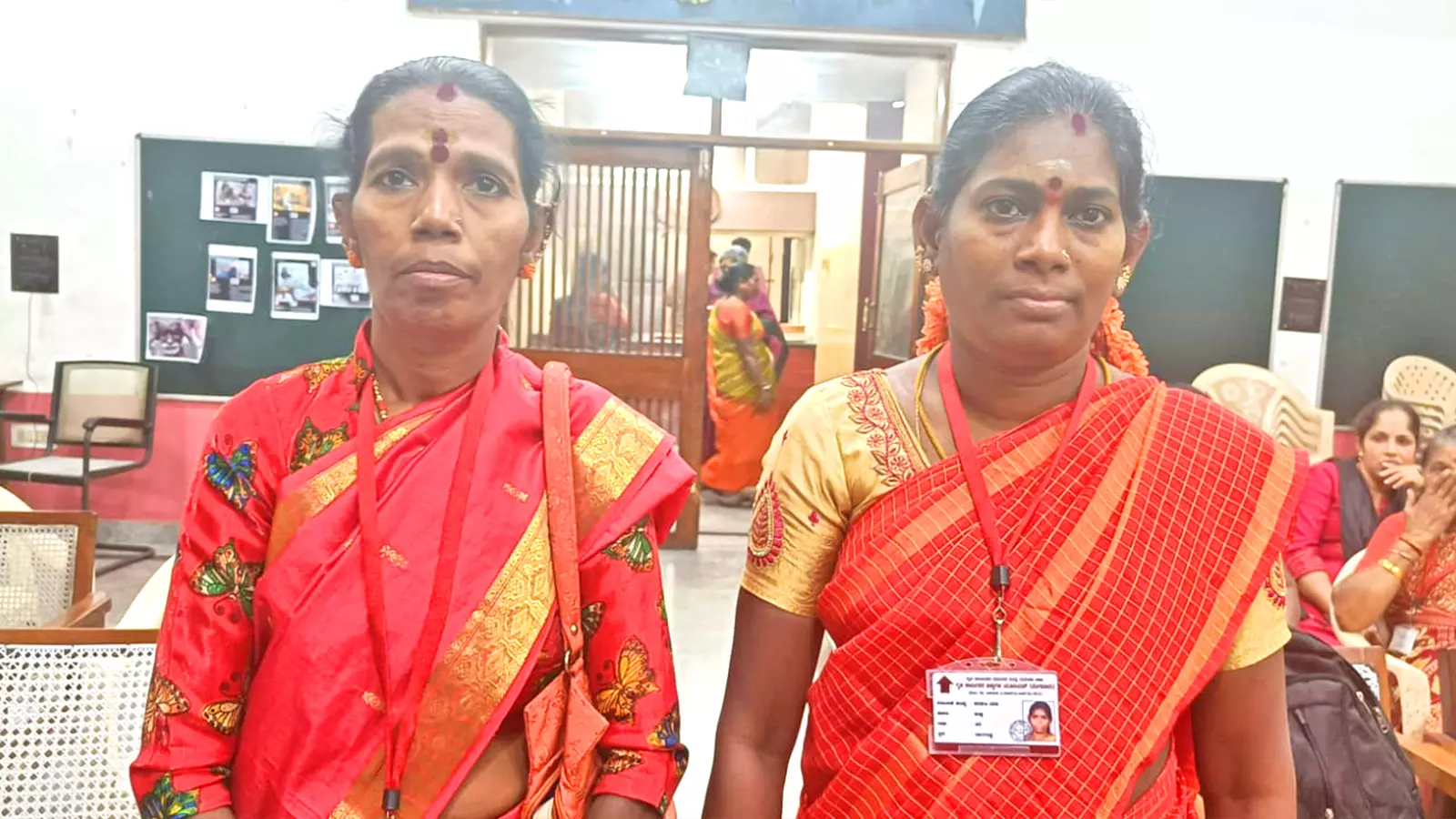
Pushpa (right) and Anu (left) are friends and members of the union.
The song is a celebration of friendship. These women are in Bengaluru and not in Bombay, Bambai or Mumbai (the many names of India's financial hub) — as referred to in the song — but they have been together like a close-knit family.
“The union has been a support system for us. It is our second home in Bengaluru. A member of the union has to pay Rs 50 yearly. We all have a membership card,” said Pushpa, who looks after the union’s accounts. She loves numbers but could not finish her school education.
Cooking, cleaning and a meagre earning
"I was married very young. I have been working for more than 10 years to support my family. I do cooking and cleaning and earn Rs 10,000 a month," added Pushpa, mother of three children.
Anu earns Rs 8,000 a month. The money is not enough to run her household. "My husband does not work anymore after he became an alcoholic. I am solely running my home. I am a mother of four children. It is not easy to manage everything with so little money," added Anu.
Indispensable yet unprotected
Almost every family with a “decent income” has domestic help in India. Often, the help is a female, who diligently supports the household by cooking, cleaning and caring for children and the elderly. Domestic workers form a pertinent but hugely disregarded segment within the informal workforce.
Unfortunately, the government does not have an accurate count of domestic workers in India. “It is a floating population. A lot of them are migrants who move from one place to another. This makes them further vulnerable to various exploitation as they are left with no power to bargain even their salaries,” said Menon.
India is home to 4.2 million domestic workers, as per the National Domestic Workers’ Movement. But experts say the number could be more than 50 million, with 75 per cent being women.
“Some of the key concerns of domestic workers are stigmatisation, absence of rights and legal protection and absence of training, support and bargaining power,” said Premila K, women’s rights activist.
Right from the National Policy on Domestic Workers to the Social Security Code 2020 (under the four labour codes)---the list of government schemes and welfare measures for domestic workers remains only on paper. Some of the benefits under them are health insurance, pension, subsidised medical facilities and educational support for children.
An activist on condition of anonymity said that the government does not care for domestic workers. “Only a few states have included domestic workers in the schedule of the Minimum Wages Act. The implementation of the controversial four labour codes has been stalled. Many have called it anti-labour. However, among the four labour codes, the Social Security Code 2020 is essential for providing social security benefits to workers.
"The question of employment security remains the primary concern for domestic workers as the government has failed to address anything related to millions of poor women," she added.
In its recently released policy paper on domestic workers, the International Labour Organisation or ILO stated that the domestic workers should be recognised as “care workers”. The international body has urged countries to ensure that domestic workers enjoy decent work and access to social security benefits.
“Ensure labour rights, social protection and access to care services that meet the needs of domestic workers, including by ratifying and implementing Domestic Workers Convention, 2011 (No. 189),” the ILO said in its paper. On June 16, 2011, the International Labour Conference of the ILO adopted the Convention concerning decent work for domestic workers. It is also known as the Domestic Workers Convention, 2011 (No. 189). It offers protection and lays down basic rights and principles for domestic workers.
A vote for betterment
Anu and Pushpa are friends. They have decided to vote for the candidate who "addresses our issues and promises to provide us security."
Sandhya* works in four houses daily to earn Rs 12,000 monthly. "The astronomical price hike of essential items has severely affected my household expenses. I wonder if political parties ever think about poor working women," said Sandhya.
Mageshwari*, 54, runs a cobbler shop to help her add to her income. The widow works in one household and gets Rs 500 monthly. "Can you imagine managing life with Rs 500 a month?" asked Mageshwari. "I have two jobs. Both pay very little. In a month, I end up earning Rs 5,000. I have a son, he too earns some money. This is my life in a nutshell," added the 54-year-old.
Old age brings more hurdles
Mageshwari's biggest fear is old age, when she won't be able to work and earn. In six years, she will be a senior citizen. "Those who work in the government sector get a pension after retirement. We neither have job security nor salary security. Pension is a dream for all of us," said Gowramma*, 70.
Gowramma, a former domestic worker, has stopped working for the last five years. "I am too old to work now. I did cleaning jobs at various houses and earned Rs 3,000 monthly."
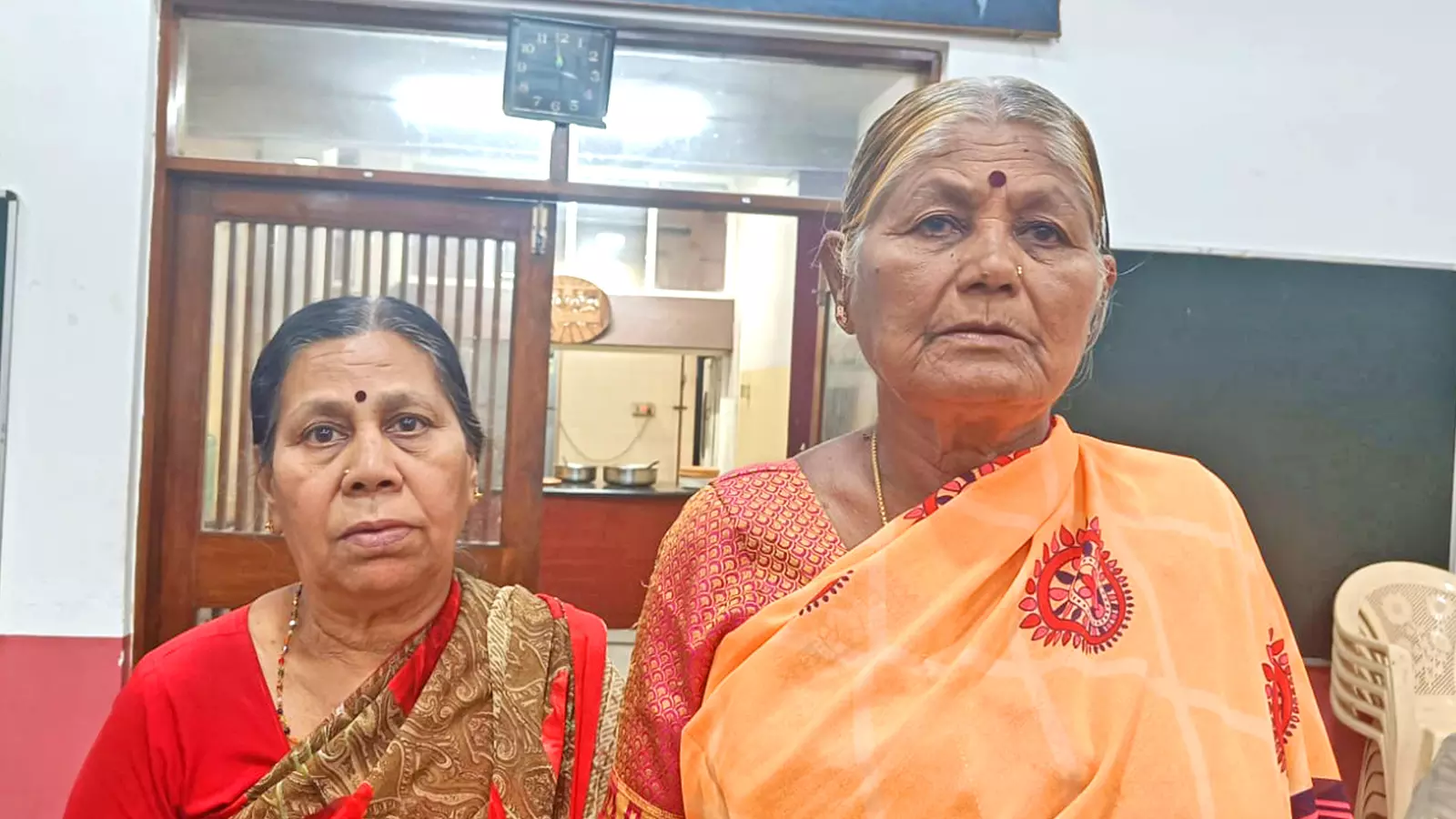
Gowramma (right) and Manju (left) say old age does not allow them to work.
In December last year, the Karnataka government announced its plans to implement special social security schemes for unorganised sector workers including weavers and tailors in the state.
Manju*, 62, said it was hard to do physical labour in old age. "But I have no other option. My husband is long dead and my son is bedridden. He is suffering from heart-related problems. I am working to save money for my son's treatment," she added.
There is an estimated 4.8 million domestic workers in India. Most of them are females. Domestic work accounts for 3.5 per cent of women's total employment. Some of the key concerns of domestic workers are stigmatisation, absence of rights and legal protection and absence of training, support and bargaining power. The workers demand dignity, rights, legal protection, support and empowerment.
*All the domestic workers write their first names only.

